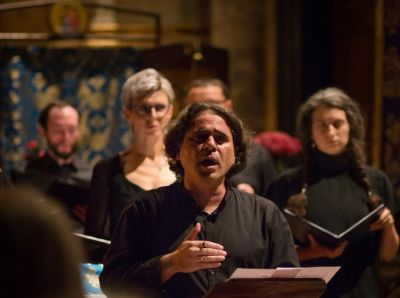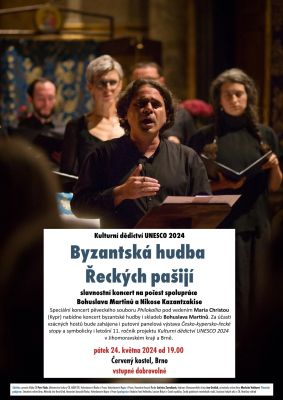FR
Byzantine inspiration of the Greek Passion | Brno

Friday 24 May 2024, 7.00 pm
Red Church, Brno, CZ
The concert will feature the Byzantine compositions used by Bohuslav Martinů in the Greek Passion opera, as well as Byzantine hymns from the newly discovered manuscript of Martinů, both in their original form and in the composer's treatment.
A special concert by the Philokallia choir led by Mario Christou (Cyprus) will offer a concert of Byzantine music and compositions by Bohuslav Martinů. With the participation of special guests, the Czech-Cypriot-Greek footprint traveling panel exhibition will also be opened, and symbolically, this year's 11th year of the UNESCO Cultural Heritage 2024 project in the South Moravian Region and Brno. Admission is voluntary.
PROGRAM
Introduction
1. Marios CHRISTOU: Te – ri – rem (from the Canonical Mass)
2. Panagiotis CHALATZOGLOU: Kratema, 1st plagal mode
3. Hospodine, pomiluj ny (Lord, have mercy on us)
Passion, part 1 – beginning of Holy Week
4. Alleluia
A Byzantine composition from the manuscript of B. Martinů (i.e. in the original, traditional form of the tune), which is known as "Alleluia of the Bridegroom" (Το Αλληλούια του Νυμφίου). With this tune, the Orthodox Church begins Holy Week on Holy Monday. This melody, which the Czech composer and musicologist Aleš Březina called "Theme of the Cross", is used by B. Martinů in both versions of the opera Greek Passion - the 1st version (London, 1957) and the 2nd version (Zurich, 1959). The original Greek traditional chant (in the fourth plagal mode) and an arrangement for a mixed choir based on the Greek Passion opera with psalm verses according to Greek liturgical practice will be played alternately.Arrangement for mixed choir: Marios Christou
5. Behold the bridegroom comes (Idou o nymphios)
A Byzantine hymn that is heard on Holy Monday immediately after the opening Alleluia.
6. The great ekthenia (Kyrie eleison)
Traditional Byzantine responsorial performance of the so-called great litany, where the choir sings "Kyrie eleison" (Lord, have mercy) at the pleas of the priest. The original Greek traditional tune (in the fourth plagal mode) and an arrangement for a mixed chorus based on both versions of the Greek Passion opera will be played alternately.
Arrangement for mixed choir: Marios Christou
7. Save, Lord, your people... (Soson Kyrie ton lao sou...)
The traditional Byzantine composition Spasiž, Pane, lid svoj... (Σώσον Κύριες τον λαό σου...) in the original, traditional form of the tune and also in the arrangement by B. Martinů (both versions of the opera). This melody has not yet appeared in any of the composer's manuscripts, but it is mentioned in the correspondence between Kazantzakis and Martinů.
8. Cherubim Song - Petros Peloponisios
Cherubic song in the fourth mode, composed by the brilliant post-Byzantine composer Peter Peloponnisius (18th century), as recorded by B. Martinů. The interpretation also contains a sort of introduction in a quasi-improvisational style of unknown origin, recorded by B. Martinů.
Wedding
9. Today is the wedding (Simera gamos ginetai)
Greek folk wedding song
10. Reading from the letter of St. of the apostle Paul of Ephesus (ch. 5, 20 – 33)
Excerpt from the Letters of St. Paul, which is an integral part of the wedding ceremony.
11. Isaiah, sing (Isaia choreve)
A traditional chant of Isaiah, a dance from a Byzantine wedding ceremony. The composition Izajáši, plesej (Ησαΐα χόρευέ) in the original, traditional form of the tune, as recorded by B. Martinů, and also in the composer's treatment (only the 1st, "London" version of the opera).
12. Silent Light - Old Song (Fos Ilaron, archaion)
Byzantine composition from the manuscript of B. Martinů (i.e. in the original, traditional form of the melody), which is part of both versions of the Greek Passion opera. B. Martinů quoted this composition in its entirety in his work, in its original, unison form.
Passion, Part 2 – Crucifixion, Resurrection
13. Hallelujah, Behold the Bridegroom Comes (Idou o Nymphios)
14. Psalm 118 (Amomos)
The setting of Psalm 118, which is part of the Orthodox funeral rite, in the original form of the tune, as recorded by B. Martinů, and also in the composer's treatment in both versions of the opera.
15. Reading of the Gospel (according to Mark, chapter 15:16-32)
16. Simeron Krematai
Holy Thursday Byzantine Chant.
17. Engomia, stasis A, I Zoi en tafo (Life in the grave) - edited by Marios Christou
The Byzantine melody of Good Friday, which B. Martinů recorded in his manuscript, but ultimately did not use.
18. Reading of the Gospel (according to Matthew, chapter 27:51-54)
19. Engomia, stasis B, Aksion esti (It is worthy)
The Byzantine hymn of Good Friday, which B. Martinů recorded in his manuscript, but ultimately did not use.
20. Engomia, stasis C, Ai geneai pasai (All generations)
The Byzantine hymn of Good Friday, which B. Martinů recorded in his manuscript, but ultimately did not use.
21. Christ rose from the dead – (Christos anesti)
The Byzantine chant of the resurrection, which B. Martinů recorded in his manuscript, but ultimately did not use.
More information here:
https://www.cultural-heritage.cz/l/byzantska-inspiration-reckych-pasiji/
https://cervenykostel.cz/udalosti/byzantska-hudba-reckych-pasiji/

